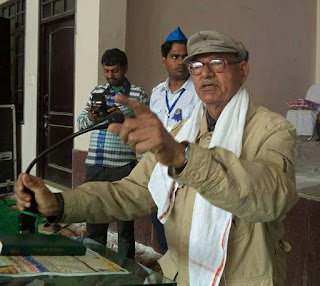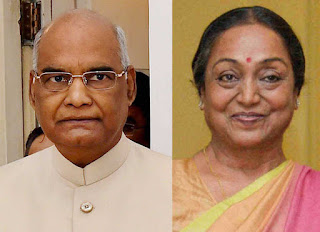Bits and Pieces – As I Please – 4
President Ram Nath Kovind:- President Ram Nath Kovind took the oath
of office on July 25 as the 14th President of India at a befitting
ceremony at the Central Hall of the Parliament of India,
keeping with the
tradition of such change of guard. Mahamahim Ram Nath Kovind appeared on the
scene quickly from nowhere and true to the dictum ‘he came, he saw and he
conquered’ reached and occupied the coveted position of Rashtrapati of Bharat. I
wish him all success in the days to come.
I wrote about President Ram Nath Kovind a couple of times earlier in
these columns. Many including the media and political observers and also the
common people were apprehensive of the qualifications and standing of the new
President to begin with. It is a matter of satisfaction, for people like me who
thought otherwise, that his two formal speeches – one short statement after his
election on July 20 and the second his statement after his oath taking on July
25 have clearly set things in the right perspective. He could clearly register
that he should not be taken lightly. He presented himself with dignity and
confidence befitting to his stature as an experienced and astute statesman with
matching moral authority of a constitutional Head of State of a great country.
In his statement on July 20, President Kovind thanked all for the
trust reposed in him. He recalled his humble origin in a “Kuchha House” in a
remote village. Referring to many poor
people like himself struggling to earn their livelihood, he said, “I represent
all those hard working people.” And added, “This is also a message to those who
earn their livelihood with hard work and honesty.” He termed his election as
“the greatness of the Indian democracy.”
Many of us, particularly from the dalit communities, expected him to
invoke the names of Babasaheb Ambedkar and his first worthy dalit predecessor
K.R. Naryananan in his first delivery but it was not to be. It was a brief
statement as President-Elect. The second, his first official speech after the
oath of office, was fulsome. Like a statesman, President Ram Nath Kovind began
by saying, “I enter this office with all humility.” Referring to his journey
from a “Mud House” to “Rashtrapati Bhawan”, he invoked the “basic mantra” of
Justice, Liberty, Equality and Fraternity enshrined in the preamble of the
constitution of India saying, “I will always follow the basic mantra.” He rightly mentioned, Babasaheb Bhim Rao
Ambedkar instilled in us the value of human dignity and republican
ethics.” Cleverly like a seasoned and
experienced politician, he avoided all other religious icons and invoked Lord
Buddha and reiterated the main tenet of India’s foreign policy by saying, “It
is appropriate that the land of Lord Buddha should lead the world in its search
for peace, tranquility and ecological balance.” The concepts of an egalitarian society and
integrated humanism of Mahatma Gandhi and Deen Dayal Upadhaya found a mention
in the much meaningful speech. There were some, probably considered, omissions
like the role and place of Jawaharlal Nehru and his dalit predecessor K.R.
Narayanan which were noticed and talked about by the critics and opponents. The
name of new icons, belonging to the ruling outfit, found mention in the speech.
It was natural and cannot be avoided.
President
Ram Nath Kovind, a calm and quite personality, who was relatively unknown on
the day of his nomination as a candidate for the highest office of the country,
has made a mark on the day one itself. The speech in Hindustani was excellent
both in its delivery and content. I am confident that the new President will
come up to the expectations of the nation at large. Going by the oath of his
office, apart from preserving, protecting and defending the constitution of
India, President is expected of devoting himself to the service and well-being
of the people of India. I wish him good health and further
success in the days to come.
Incidentally, I have had opportunities to meet and interact with some
of the Presidents of India. My immediate boss in PMO in 1974-77, Vimla Sindhi,
popularly known as Behanji, who was a family friend of President Fakhruddin Ali
Ahmed, took me to a cricket match at Firoz Shah Kotla Stadium in Delhi and we
witnessed the match sitting with President Fakhruddin Ali Ahmed and the family
in the VVIP stand. I worked with President K.R. Narayanan in Bejing (China) in
1977-78 when he was India’s Ambassador to China. I met and interacted with
President Giani
Zail Singh during his visit to Sanaa (Yemen) in 1984, President
APJ Abdul Kalam in 1998-99 when he was the Scientific Adviser to the Minister
of Defense. The incumbent President Ram Nath Kovind in 2001 when he kindly came
for the marriage of my daughter Vaishali along with his gracious wife Savita
Behan who is a close friend of my sister Kamla of Delhi. Subsequently,
President Ram Nath Kovind visited my brothers at Bootan Mandi Jalandhar during
the visit of Lal Krishan Advani. I
cherish memories of my association and interaction with these high-ups and may
write about this separately at some later date.
**************************************
Political Hopping – Undemocratic Circus: - The recent somersault of CM of Bihar,
Nitish Kumar is the provocation to write about this undemocratic circus of
changing sides. It is a negation of democracy and must be curved forthwith. It
will prove to a “Grammar of Anarchy”, in the terminology of the father of the
Constitution of India, Dr. B.R. Ambedkar, for the polity and our country.
Harish Khare of the Tribune has commented on the Nitish
saga, “A neat coup has been staged in Patna. Brilliantly
conceived and cleverly executed. Not with tanks and commandos but with a convenient
conscience and gentrified opportunism. Within a space of 24 hours, a chief
minister resigns, divests himself of his designated alliance partners, teams up
with his declared political rivals and becomes chief minister again after
getting sworn in at an unseemly superfast speed by a very obliging Governor.”
Our
constitution has worked well in the face of many challenges of poverty,
illiteracy, caste system, graded inequality, feudalism, religious dogmas etc.
There are some glaring failures too, not because the constitution is bad but
because “man is vile” as assessed by Dr. Ambedkar himself. One of the major
failures, to my mind, is that even after 67 years of our becoming a democratic
republic, polarization of political forces could not happen on the basis of
ideology, programme and agenda. Ideally, there should be only three political
main streams, keeping in mind that the Communists are increasingly getting out
of reckoning not only in India but also in the world – (i) Centre – Let us say Middle path – Socialists,
Communists, Janta Dals and Lok Dals of all hues, etc. (ii) Left of the Centre – Congress, TMC, BSP
etc. and (iii) Right of the Centre – BJP, Shiv Sena, Hindu outfits etc. All
regional parties like Akali Dal, DMK, AIDMK, BJD, National Conference, PDP,
Assam Gana Parishad etc. should be confined to their respective states. They
should align themselves with any of the three streams before elections by law.
Any MLA or MP who intends to change his or her affiliation will automatically
loose his or membership of the legislature or the house of parliament.
Political parties too should not be permitted to change their group
affiliations or say coalition partnership mid-way. It can be done only at the
time of elections. It has been observed over the years that politically
disgruntled elements and opportunists tend to subvert the system for personal
advantage rather than caring for the ideology and programme of the party they
belonged to. The electoral reforms introduced so far could not help the matter
to prevent and eliminate political hopping, unfortunately. This undemocratic
circus must be stopped forthwith. The national status of political parties
should be determined not only on the basis of percentage of votes polled but
also in a given number of states. These measures are needed to deter the Aaya
Rams – Gaya Rams of Indian politics to negate the democratic system for their
selfish motives. India has come a long way in its constitutional development
but it has yet to attain the political culture conducive for democracy.
Political opportunism has to be checked, the sooner the better. My motivating
guru of ‘As I Please”, Kunwar Natwar Singh has commented very candidly, “Loyalty
and politics are strangers. The past few days have displayed low-class
political opportunism. The enemies of yesteryears have become friends today.
When the next opportunism appears, opportunists cannot be far away.” It is sad
commentary on this aspect of our polity.
Babasaheb
B.R. Ambedkar was very particular in placing morality above other things in
electing the people’s representatives. He said, “The education can hardly be
the sole qualification for membership of the parliament. If I may use the words
of Buddha he said that
man requires two things: one is ‘Gyan’ and the other is
‘Sheel’. Gyan without Sheel is very dangerous. It must be accompanied by Sheel
by which we mean character, moral courage, ability to be independent of any
kind of temptation, truthful to ones ideals. I am very keen to see that no
member enters this august assembly who does not possess Sheel in adequate
degree.”
We
may ignore these hard realities at our own peril.
Barbaadi-e-gulshan ke liye
Jab ek hi ullu kafi tha
Har shaakh pe ullu baitha hai
Anjaam-e-gulistaan kya hoga..!?
Jab ek hi ullu kafi tha
Har shaakh pe ullu baitha hai
Anjaam-e-gulistaan kya hoga..!?
***********************************
Without Comment:-
“Mao Zedong a keener student of the Art of War than of the Das Kapital
saw Tibet in strategic terms. He said the Tibetan plateau was the palm with
Ladakh, Nepal, Sikkim, Bhutan and Arunachal Pradesh as the five fingers. With
China gaining influence in Nepal, now threatening to recognize Sikkim as
independent and obliquely hinting at stoking a democratic revolution in the
Kingdom of Bhutan, Beijing may have plans to join the five fingers to the
palm.”
Thumten Samphel, Director of the Tibet
Policy Institute in his article “China’s Great Game” published in the Outlook
Magazine – July 24, 2017 issue.














